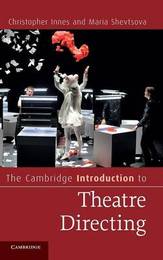
|
The Cambridge Introduction to Theatre Directing
Hardback
Main Details
| Title |
The Cambridge Introduction to Theatre Directing
|
| Authors and Contributors |
By (author) Christopher Innes
|
|
By (author) Maria Shevtsova
|
| Series | Cambridge Introductions to Literature |
|---|
| Physical Properties |
| Format:Hardback | | Pages:298 | | Dimensions(mm): Height 234,Width 155 |
|
| ISBN/Barcode |
9780521844499
|
| Classifications | Dewey:792.0233 |
|---|
| Audience | | Tertiary Education (US: College) | |
|---|
| Illustrations |
17 Halftones, unspecified; 1 Line drawings, unspecified
|
|
Publishing Details |
| Publisher |
Cambridge University Press
|
| Imprint |
Cambridge University Press
|
| Publication Date |
2 May 2013 |
| Publication Country |
United Kingdom
|
Description
This Introduction is an exciting journey through the different styles of theatre that twentieth-century and contemporary directors have created. It discusses artistic and political values, rehearsal methods and the diverging relationships with actors, designers, other collaborators and audiences, and treatment of dramatic material. Offering a compelling analysis of theatrical practice, Christopher Innes and Maria Shevtsova explore the different rehearsal and staging principles and methods of such earlier groundbreaking figures as Stanislavsky, Meyerhold and Brecht, revising standard perspectives on their work. The authors analyse, as well, a diverse range of innovative contemporary directors, including Ariane Mnouchkine, Elizabeth LeCompte, Peter Sellars, Robert Wilson, Thomas Ostermeier and Oskaras Korsunovas, among many others. While tracing the different roots of directorial practices across time and space, and discussing their artistic, cultural and political significance, the authors provide key examples of the major directorial approaches and reveal comprehensive patterns in the craft of directing and the influence and collaborative relationships of directors.
Author Biography
Christopher Innes is Distinguished Research Professor at York University, Toronto, and Research Professor at Copenhagen University. Fellow of the Royal Society of Canada, and of the Royal Society of Arts (UK), as well as a Killam Fellow, he holds the Canada Research Chair in Performance and Culture. Author of fifteen books - translated into eight different languages - he has also published over 120 articles on various aspects of modern drama. He is General Editor of the Cambridge Directors in Perspective series, Co-Editor of the Lives of the Theatre series, Contributing Editor to The Cambridge Guide to World Theatre and has been Co-Editor of the quarterly journal Modern Drama. He has been a visiting Professor in Australia, Germany and Japan, and has lectured around the world, as well as holding visiting Fellowships at Corpus Christi and St John's Colleges in Cambridge. His website is www.moderndrama.com. Maria Shevtsova is Professor of Drama and Theatre Arts at Goldsmiths, University of London and a Fellow of the International Research Center 'Interweaving Performance Cultures' at the Freie Universitat in Berlin. Author of numerous books, including Dodin and the Maly Drama Theatre: Process to Performance (2004) and over 100 articles in refereed journals and chapters of collected volumes, her publications have been translated into seven languages. She is the co-editor of New Theatre Quarterly and a member of the editorial team of Critical Stages, the online journal of the International Association of Theatre Critics. She is on the editorial boards of various international journals including the Russian-British Stanislavski Studies and Polish Theatre Perspectives. She has been a Visiting Professor at various institutions across the world, including the Academy of Theatre Arts in St Petersburg.
Reviews'This history of directing and directors in Western theater is an eminently useful volume that should be a part of every serious theater library ... Recommended. All readers.' M. S. LoMonaco, Choice 'Anyone seeking a really good one volume overview of the history and practice of directing from the ancient Greeks to today would do well to take a close look at this new volume ... a valuable introduction to an immensely complicated field.' Critical Stages
|